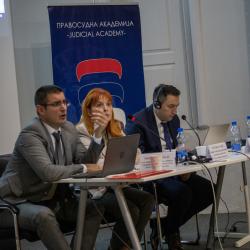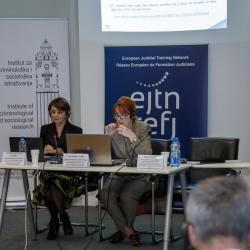Criminal law of the European Union in the context of the legal system of the Republic of Serbia
The Judicial Academy, in cooperation with the European Judicial Training Network (EJTN) as part of the project "Western Balkans II" on March 11 and 12 in Belgrade, organized training for lecturers and experts on the topic: "Criminal law of the European Union in context of the legal system of the Republic of Serbia". The training for lecturers and experts in the subject area brought together 20 participants, members of the National Network of Judges and Prosecutors for the Implementation of the Standards of the European Court of Human Rights in the Republic of Serbia, as well as judges and public prosecutors from the area of all four appeals.
The training for lecturers and experts in the subject area was opened by the director of the Judicial Academy Nenad Vujić, the representative of the European Union delegation in the Republic of Serbia Silvija Panović Đurić and the manager of the "Western Balkans II" project of the European Judicial Training Network (EJTN) Vanja Tekić.
Also, judge and expert for judicial and prosecutorial matters on the project "Supporting Serbia in achieving the goals of Chapter 24: justice, freedom and security", Marta Pizzaro Mayo, held a presentation of the Manual on the use of circumstantial evidence in cases of economic crimes and money laundering - examples from practice courts in the European Union and the Republic of Serbia.
The key topics covered at the training for lecturers and experts in the subject area were:
• The status of compliance of the legal system of the Republic of Serbia with the law of the European Union
• Fundamentals of European Union law
• Judicial cooperation in criminal matters
• European Arrest Warrant
• European investigation warrant
• Admissibility and legality of evidence in criminal proceedings
• Minimum procedural standards in criminal proceedings
• EC Court practice regarding minimum procedural standards (ne bis in idem and victims' rights - case study/reasoning of judgments)
• The current state of harmonization of substantive criminal law in the European Union
The lecturers at the training for lecturers and experts in the subject area were:
- Nevenka Važić, judge of the Supreme Court of Serbia (retired), lecturer at the Judicial Academy
- Milan Bajić, senior legal advisor, specialist in harmonization of court practice, Cabinet of the President of the Supreme Court of Serbia, referred to the European Court of Human Rights
- Mariaemanuela Guerra, Deputy Public Prosecutor before the Supreme Court of Cassation of Italy, former judge of the Supreme Court of Cassation of Italy
- Razvan Radu, public prosecutor before the Supreme Court of Cassation of Romania, professor of European Union law and the European Convention on Human Rights
- Nikola Pantelić, public prosecutor, Basic Public Prosecutor's Office in Belgrade, previously referred to the Higher Public Prosecutor's Office in Belgrade







